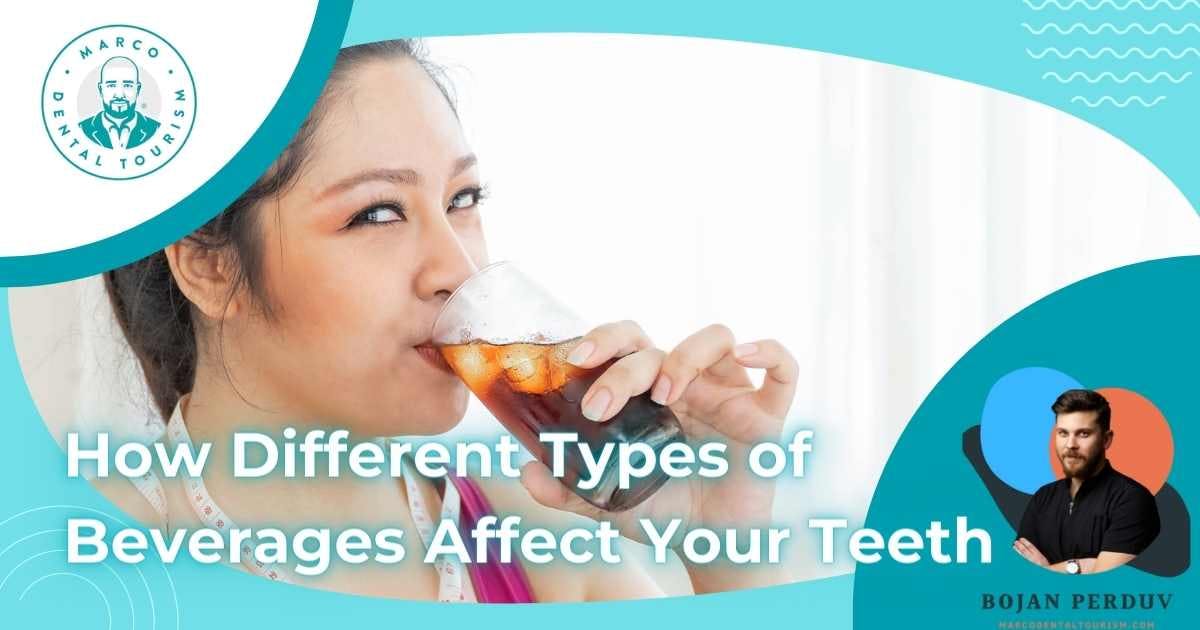Teeth and Drinks: How to Save Your Teeth and Enjoy Your Favorite Drink

Have you ever thought about what your favorite drink can say about your character? Australian scientists investigated the relationship between favorite drinks and personality type. For example, people who like coffee are usually energetic and ambitious, while those who drink tea are more relaxed and introspective. Beer lovers proved to be open, sociable, and communicative, while those who love wine are usually very likable and responsible. But, frequent intake of especially sweet drinks can damage the tooth enamel and endanger the health of the teeth by forming dental plaque stones. That is why we deal with the prevention of dental diseases due to the consumption of various drinks.
Why can some drinks endanger the health of our teeth?
Sugar added to drinks to make them sweet and tasty is the main reason some drinks damage teeth. When sugar is consumed, bacteria in the mouth turn it into acids. These acids then attack the enamel or outer layer of the teeth. Over time, the acids can break down the enamel and lead to tooth decay.
Which drinks have the most negative effect on the teeth?

There are many drinks that have a negative effect on the teeth. Here is a list of the five most commonly consumed drinks that can have negative consequences for the health of our teeth:
- Coffee: Coffee can cause stains and discoloration of the teeth because it is a drink with high acidity, which can make the teeth more porous and susceptible to dental caries.
- Tea: Like coffee, tea can also cause tooth stains and discoloration. In addition, tea contains fluoride, which can help protect teeth from cavities. However, too much fluoride can lead to a condition called fluorosis, which causes white spots or streaks on the teeth.
- Wine: Due to its acidic composition, frequent consumption of wine can cause tooth erosion as well as the formation of dark spots on the teeth.
- Carbonated drinks: Carbonated drinks are among the most harmful drinks for teeth because of the added sugar and color. Due to regular consumption, sugar from drinks can feed bacteria in the mouth, which leads to the accumulation of plaque and caries that cause damage, discomfort as well as toothache.
- Energy drinks: As mentioned above, the high levels of acid and sweeteners in these drinks can lead to tooth decay and erosion. In addition, the caffeine in energy drinks can lead to dehydration, which can also cause more serious dental problems. That is why it is very important to take in a sufficient amount of water in order to wash off the sugar from the surface of the teeth and to maintain the necessary hydration and cleanliness of the mouth and teeth.
Is water good for our teeth?

Given the fact that 70% of the human body is made up of water, water plays a vital role in health in general, especially for the health of our teeth.
Here's an explanation of how water helps maintain healthy dental hygiene:
- Water cleans teeth. Water helps to wash away food and surface food residues from the teeth.
- It hydrates. Water helps keep the mouth moist, preventing dry mouth and ensuring our saliva can do its job of protecting teeth.
- It dilutes the acid. Water helps to dilute the acids in the mouth, reducing the risk of tooth decay.
- Protects teeth. Drinking water rich in fluoride can help prevent tooth decay.
- Freshens your breath. Water is the healthiest choice for quenching thirst and maintaining a healthy mouth, making it the best drink for the problem of bad breath.
What drinks help strengthen teeth and gums?

There are many drinks that have a negative effect on the teeth. Here is a list of the five most commonly consumed drinks that can have negative consequences for the health of our teeth:
- Plain water: As we have already mentioned, water is the best drink for healthy teeth, because it helps to wash away harmful bacteria and food residues accumulated on the teeth. You should drink as much water as possible every day.
- Milk: Due to the enrichment of calcium, an element that is necessary for strong teeth, especially in children who are in the development phase, milk is a good choice for teeth that are just sprouting.
- Green tea: Green tea contains catechins, antioxidants that can help protect teeth from damage and stop the accumulation of bacteria harmful to the gums.
- Orange juice or lemonade: This drink is rich in vitamin C, a key element of good immunity and healthy teeth.
- Green smoothies: Natural juices are a real source of vitamins A and C, which are healing for teeth. Mix some spinach, kale, or other green vegetables with a little lemon juice and water and blend in a blender or mixer.
What drinks to avoid after teeth whitening?
Teeth whitening is an aesthetic treatment to achieve a brighter, so-called Hollywood smile. However, there are a few drinks to avoid after teeth whitening to achieve more lasting results:
- Coffee: Caffeine can stain your teeth yellowish-brown. Wait at least 30 minutes after teeth whitening before drinking coffee.
- Hot chocolate: Chocolate sticks to the teeth, making them brown, which impairs the effect of the treatment. Avoid hot chocolate or other drinks containing chocolate immediately after the treatment.
- Sports drinks: Because of the acid they contain, sports drinks can cause the appearance of dark spots on the teeth.
- Red wine: Wine is another drink that can stain your teeth. The deep red color of the wine can quickly undo all the teeth-whitening work. Therefore, wait a while before toasting.
- Citrus fruits can make teeth sensitive after whitening because of the high level of acidity they contain.
How to keep your teeth white without avoiding coffee?

Here are some tips for maintaining white teeth without giving up coffee:
- Use a straw: This will help keep the coffee from coming into direct contact with your teeth, which will help prevent dark stains on your teeth.
- Rinse your mouth with water after drinking coffee: This will remove coffee residue that could potentially stain your teeth.
- Brush your teeth regularly: This can help remove any coffee stains that may have already formed and hardened on your teeth, as well as prevent new stains from forming.
- Visit your doctor regularly: Prevention is the most important part of health, and that's why a visit to the dentist is of key importance in preventing the spread of bacteria and caries, without giving up the great pleasure of drinking your favorite beverage.
Does hot water with lemon harm your teeth?
Warm, but not hot, water with lemon does not harm the teeth. The acidic nature of lemon juice can break down tooth enamel, but lukewarm water dilutes the lemon juice and prevents it from damaging your teeth.
Our Conclusion

Let's sum it up! Since it is obvious that taking care of our teeth and habits in the choice of drinks and food can have a profound effect on our general health and well-being, with simple changes in lifestyle and diet we can enjoy the benefits of a healthy mouth and a healthy body for many years. The best indicator of how food affects teeth is a true feeling of satisfaction after every meal, without worrying that we will regret it at the first next examination.











Share your opinion!
What do you think about this topic?
Comments (0)